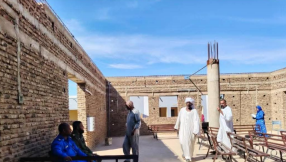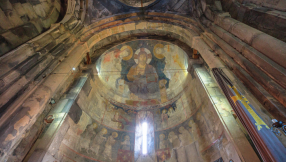
Is Franklin Graham selling #FakeNews about Christian persecution?
It's a serious question on a serious issue, prompted by a recent statement by evangelist and conservative Christian commentator Franklin Graham.
He was speaking at the World Summit in Defense of Christians, a four-day conference in Washington, DC aimed at highlighting the plight of the persecuted Church.
'It is safe to say over 100,000 a year are killed because of their faith in Christ. In the last 10 years that would be close to a million people. It's the equivalent of a Christian genocide,' he said on Wednesday.
'I am sure the number of Christians who are in prison or martyred each year would stagger our mind if we really knew what the total number really was. And it would send us to our knees in sorrow and in prayer.'
The problem is, it's not clear what Graham's statistic of 100,000 annual Christian killings is based on. That's problematic because compared to all other statistics on the matter, his figure is highly dubious.
In its 2016 review (covering a 12 month period ending 31 October 2015), Open Doors, a charity that advocates for the persecuted church, estimated that over 7,000 Christians were killed because of their faith.
Open Doors' director of research Dr Ron Boyd-Macmillan spoke about persecution statistics in January on Radio 4's More or Less programme. Describing its 2017 review, he said that just 1,207 Christians had been killed for faith-related reasons in 12 months – a dramatic reduction from the previous year, and a far cry from Graham's statistic.
Why the discrepancy? The figure of 90-100,000 Christians killed annually for their faith is one not exclusive to Graham. In 2013, the Vatican called it a credible number. As research by BBC News shows, the figure derives from the Center for the Study of Global Christianity (CSGC) at Gordon-Conwell Theological Seminary in Massachusetts.
As journalist Ruth Alexander wrote: 'Its researchers started by estimating the number of Christians who died as martyrs between 2000 and 2010 – about one million by their reckoning – and divided that number by 10 to get an annual number, 100,000.'
The decade-spanning one million estimate is largely drawn from the death toll of the Democratic Republic of Congo's civil war. Of the four million estimated to have been killed in that war, the CSGC reckons 20 per cent (900,000) to be martyrs. Divided by 10, that provides the statistic of 90,000 annually.
There are several problems with the extrapolation: firstly, it can't be guaranteed that the Christians killed in the DRC's civil war were killed because of their faith. Even if it were true, it's still a distortion of the global picture, and since the DRC's civil war ended in 2003, can hardly be described as accurate for the year 2017.
Todd Johnson, director of the CSGC says it has now abandoned that statistic, aware of its flaws, though it still estimates a million martyrs from 2000-2010 on its website.
Professor Thomas Schirrmacher from the International Society for Human Rights argues that highlighting the figures on global persecution is essential, but admits that specific statistics on annual martyrdom are hard to reach. In recent years he says, there's no chance that the number has been higher than 10,000.
Dr Boyd-Macmillan said: 'There is unfortunately a lot of exaggeration in this area. This is why we opt for a statistic that we know is lower than it probably should be, but you've got to give figures you can absolutely verify.
'Preferably we're talking to someone who has witnessed it or has been quite close to the killing and make sure that it really happened.'
Open Doors only include cases where it can be sure that religion was cause of killings. How does it explain a figure of just 1,207 martyrs in the 2017 review?
Boyd-Macmillan explains: 'Usually half of all killings come in Nigeria. That's mainly because of very extremist movements like Boko Haram. But this year they've actually been pushed out of a lot of the territory that they held or terrorised before.'
Likewise, in regions like Syria and Iraq, where many Christians have been killed 'the Christians have largely fled, so they're not there to kill any more'.
As that sobering analysis shows, the reduction in actual deaths is hardly good news. As Boyd-Macmillan explains, merely analysing deaths isn't the best way to analyse actual persecution. There are more subtle and effective ways to suppress Christian witness than simply killing believers, which often has the unintended effect of making martyrs and galvanising the Christian community.
It's why Open Doors' World Watch List is so helpful: it's a thorough analysis of the places in the world where its hardest to live freely as a Christian – where the threat is far more cunning and insidious than the prospect, grave though it is, of simply being killed. As Boyd-Macmillan puts it: 'You've got to understand how Christians are squeezed as much as how they're smashed.'
The idea that anyone would be killed for their faith is horrific: the conservative statistic of 1,207 martyrs in the past year is still tragic. But when influential voices repeat misleading statistics like 100,000, it actually undermines their important message.
None of this should be taken as a suggestion that Christians should calm down because global persecution isn't that bad. It is terrible, and on the rise, but that means those who speak about it need to be more vigilant than ever in what they actually say. It undermines the suffering of the persecuted when you blow the tragic truth out of proportion.
You can't promote misleading figures just because they 'feel' like they should be true, or as a rhetorical flourish to make a point. This isn't a time for the Church to join in with 'alternative facts' and 'post-truth' politics.
Christians can't condemn #FakeNews when they don't like it, and sell it when they do. The global Church deserves better.
You can follow @JosephHartropp on Twitter













